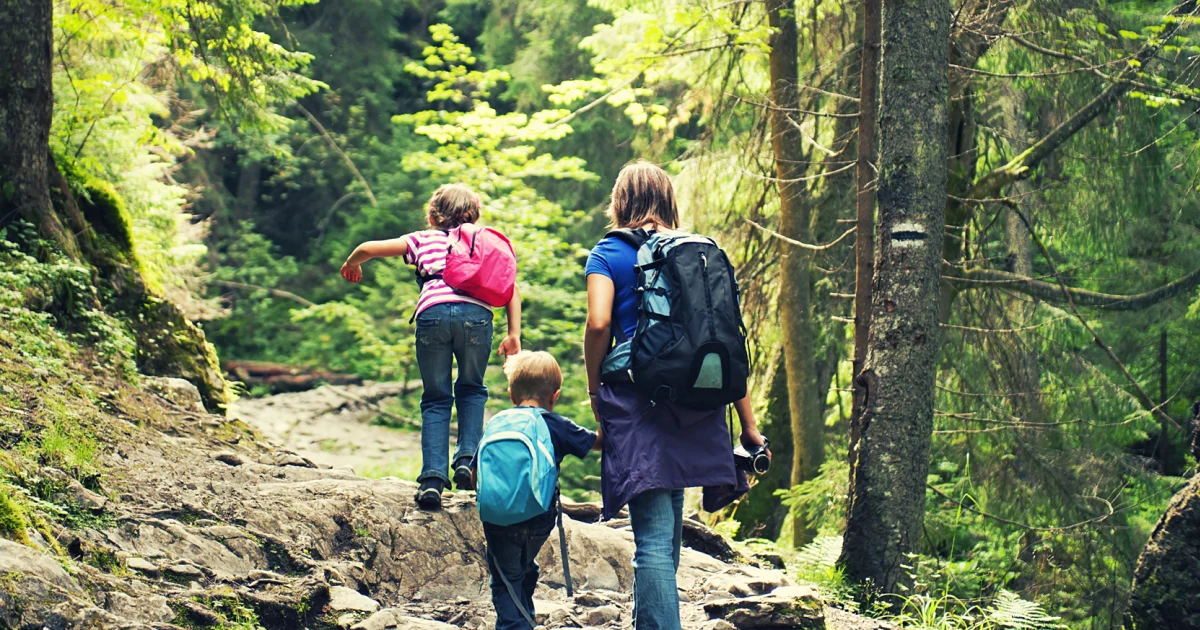
Hiking to Reduce Stress: Your Complete Guide to Nature's Most Powerful Mental Health Remedy
In our fast-paced, hyperconnected world, stress has become an unwelcome constant companion for millions of people. Yet, the solution to this modern epidemic might be simpler than we think. Through years of personal experience and extensive research, I've discovered that hiking to reduce stress offers one of the most effective, natural remedies available. This comprehensive guide explores the science-backed benefits, practical techniques, and transformative power of using nature's trails as your personal therapy session. Whether you're a complete beginner or seasoned hiker, you'll learn how to harness the healing power of the outdoors for lasting mental health benefits.
The Science Behind Hiking to Reduce Stress

During my first serious attempt at hiking to reduce stress, I was skeptical about whether simply walking in nature could provide meaningful relief from my anxiety and work pressures. However, recent neuroscientific research has validated what many outdoor enthusiasts have known intuitively for years. A groundbreaking Stanford University study found that participants who walked for 90 minutes in natural environments showed decreased activity in the subgenual prefrontal cortex, a brain region associated with rumination and depression.
The physiological mechanisms behind hiking's stress-reducing effects are fascinating and multifaceted. When we engage in moderate hiking, our bodies release endorphins, often called "nature's antidepressants," which create feelings of euphoria and well-being. Simultaneously, cortisol levels—our primary stress hormone—begin to decrease within just 20 minutes of forest exposure. This hormonal shift creates a cascade of positive effects throughout our nervous system.
Japanese researchers have extensively studied "forest bathing" or shinrin-yoku, revealing that phytoncides—antimicrobial organic compounds released by trees—can boost our immune system while reducing stress markers. I've personally experienced this phenomenon during my regular hikes in the Pacific Northwest, where the dense forest canopy seems to create an almost magical atmosphere of calm and restoration.
The attention restoration theory, developed by environmental psychologists, explains why mindfulness while hiking proves so effective. Natural environments engage our "soft fascination"—a gentle, effortless attention that allows our directed attention systems to rest and recover. This mental reset is crucial for managing the cognitive fatigue that contributes to chronic stress in our daily lives.
Physical Benefits That Combat Stress
Watch this UNC Health video explaining the mental health benefits of outdoor activities
The physical act of hiking creates a powerful foundation for stress reduction that extends far beyond the mental benefits. When I first started tracking how many calories burned hiking, I was amazed to discover that a moderate 2-hour hike burns between 400-700 calories while simultaneously strengthening my cardiovascular system and building resilience against stress-related health issues.
Regular hiking practice strengthens our parasympathetic nervous system—the "rest and digest" response that counteracts chronic stress activation. Through consistent trail time, I've noticed significant improvements in my heart rate variability, a key indicator of stress resilience and overall cardiovascular health. The rhythmic nature of walking, combined with deep breathing in fresh air, activates the vagus nerve, which plays a crucial role in our body's relaxation response.
The weight-bearing nature of hiking, especially on uneven terrain, stimulates bone density while improving balance and coordination. These physical improvements create a positive feedback loop—as we become stronger and more confident in our bodies, we develop greater resilience to handle life's stressors. The gentle impact of hiking is particularly beneficial for those recovering from high-intensity stress or burnout, providing effective exercise without overwhelming an already taxed system.
Sleep quality improvements represent another crucial physical benefit of hiking to reduce stress. The combination of physical exertion, natural light exposure, and reduced screen time creates ideal conditions for healthy circadian rhythm regulation. After establishing a regular hiking routine, most people report falling asleep faster and experiencing deeper, more restorative sleep cycles—essential components of effective stress management.
Mental and Emotional Healing on the Trail

The mental and emotional transformations that occur during hiking extend far beyond temporary stress relief, creating lasting changes in how we process challenges and maintain psychological well-being. During my most difficult period dealing with work-related anxiety, I discovered that hiking and anxiety management go hand in hand, providing both immediate relief and long-term coping strategies.
Nature's inherent unpredictability teaches us valuable lessons about adaptability and resilience. When facing unexpected weather changes, challenging terrain, or navigating with limited visibility, hikers develop problem-solving skills and emotional regulation techniques that transfer directly to daily life situations. I've found that the confidence gained from successfully completing challenging hikes translates into increased self-efficacy in handling workplace stress and personal challenges.
The meditative qualities of rhythmic walking create natural opportunities for processing emotions and gaining perspective on life's challenges. Many hikers report experiencing breakthrough moments of clarity while on trails, as the combination of physical movement and natural beauty facilitates a state of relaxed awareness conducive to insight and emotional healing. The absence of digital distractions allows for deep introspection and mental decluttering that's increasingly rare in our connected world.
Social hiking experiences provide additional mental health benefits through community connection and shared achievement. Whether joining hiking groups or exploring trails with friends and family, the social bonds formed through outdoor adventures create support networks that enhance overall resilience to stress. These relationships often prove more meaningful than those formed in urban environments, as shared challenges and natural beauty create deeper connections.
Practical Techniques for Stress-Relief Hiking

Developing effective techniques for hiking to reduce stress requires intentional practice and gradual skill building. For beginners wondering is hiking hard, I always recommend starting with short, easy trails and focusing on technique development rather than distance or speed. The goal is creating positive associations with outdoor activity rather than adding performance pressure to an already stressed system.
Mindful hiking represents the most powerful technique I've discovered for maximizing stress-relief benefits. This practice involves deliberately engaging all five senses while walking: feeling the ground beneath your feet, listening to bird songs and wind through trees, observing the play of light and shadow, breathing in the fresh air, and even tasting the crispness of mountain air. This sensory engagement anchors you in the present moment and interrupts the stress-perpetuating cycle of rumination and worry.
Breathing techniques during hiking can dramatically enhance the stress-reduction benefits. I practice the 4-7-8 breathing pattern while walking: inhaling for 4 steps, holding for 7 steps, and exhaling for 8 steps. This technique activates the parasympathetic nervous system and creates a meditative rhythm that synchronizes mind and body. During challenging ascents, focusing on breath work transforms potential stress into an opportunity for mindfulness practice.
Setting intentions before each hike helps maximize the therapeutic benefits. Whether seeking clarity on a specific problem, processing difficult emotions, or simply creating space for mental restoration, having a clear purpose enhances the healing potential of your trail time. I often write down my intentions before hiking and reflect on them during rest stops, creating a structured approach to outdoor therapy that yields consistent results.
Essential Gear for Your Stress-Relief Adventures
Proper gear selection can significantly enhance your stress-relief hiking experience by ensuring comfort, safety, and peace of mind on the trails. Having the right equipment allows you to focus on the therapeutic aspects of hiking rather than worrying about discomfort or safety concerns. Through years of trial and error, I've identified several essential items that make every stress-relief hiking session more effective and enjoyable.
Quality Hiking Boots for Comfort and Support
Investing in proper footwear is crucial for stress-free hiking experiences. Uncomfortable feet can quickly turn a therapeutic nature walk into a source of additional stress and frustration.
Lightweight Hiking Backpack
A comfortable daypack allows you to carry essentials without adding unnecessary burden to your stress-relief journey. Look for breathable designs with proper weight distribution.
Mindfulness and Hiking Guidebooks
Combining hiking with mindfulness practices can exponentially increase the stress-relief benefits. These resources provide structured approaches to outdoor meditation.
Portable Hydration Solutions
Staying properly hydrated is essential for maintaining energy levels and mental clarity during stress-relief hikes. Collapsible bottles offer convenience without bulk.
Additional gear considerations include weather-appropriate clothing layers, a basic first aid kit, and navigation tools. However, remember that hiking to reduce stress shouldn't become an equipment obsession. Start with basics and gradually add items as you develop your practice and understand your specific needs. The goal is enhancing your experience, not creating additional complexity or financial stress.
Building a Sustainable Hiking Practice
Creating a sustainable hiking practice for stress management requires realistic goal setting, flexible scheduling, and gradual progression. The most common mistake I see among beginners is attempting too much too soon, leading to burnout or injury that disrupts the entire stress-relief routine. Instead, focus on consistency over intensity, building a practice that becomes a reliable source of mental restoration rather than another source of pressure.
Start with weekly "stress-relief hikes" of 30-60 minutes on local trails, gradually increasing duration and difficulty as your fitness and confidence improve. I recommend tracking your mood and stress levels before and after each hike to document the benefits and maintain motivation during challenging periods. This data becomes particularly valuable when convincing skeptical family members or employers about the importance of protecting your hiking time.
Seasonal adaptation ensures year-round stress management benefits from hiking to reduce stress. Winter hiking offers unique opportunities for solitude and introspection, while spring and summer provide longer daylight hours and diverse trail options. During my years of year-round hiking, I've discovered that each season offers distinct therapeutic benefits, from the meditative quality of snow-covered trails to the energizing effect of wildflower meadows.
Integration with daily life requires protecting your hiking time as sacred space for mental health maintenance. This might mean scheduling hikes like important meetings, finding hiking partners who share your commitment to stress management, or identifying multiple backup trail options for different weather conditions and time constraints. The key is creating systems that support consistency rather than relying on motivation alone, which naturally fluctuates during stressful periods.
Conclusion
Throughout this comprehensive exploration of hiking to reduce stress, we've uncovered the remarkable depth and breadth of benefits that nature-based therapy provides for mental health and overall well-being. From the neurochemical changes that occur in our brains during forest exposure to the practical techniques that maximize therapeutic benefits, hiking represents one of the most accessible and effective stress management tools available to modern society.
The scientific evidence supporting hiking's stress-reduction benefits continues to grow, validating what outdoor enthusiasts have known intuitively for generations. The combination of physical exercise, natural beauty, mindfulness opportunities, and social connection creates a powerful synergy that addresses stress from multiple angles simultaneously. Unlike many stress management techniques that require expensive equipment or specialized training, hiking to reduce stress is accessible to people of all fitness levels and financial situations.
As we navigate an increasingly complex and stressful world, the simple act of walking in nature becomes both a form of resistance against modern pressures and a proactive investment in our long-term mental health. The trails await as your personal therapy office, offering unlimited sessions with nature's most skilled counselor. Whether you're seeking immediate relief from acute stress or building long-term resilience against life's challenges, the path forward literally lies at your feet.
Begin your journey today with a simple 20-minute walk on the nearest trail. Your stressed mind and body will thank you, and you'll discover why millions of people worldwide have found their peace, perspective, and power through the transformative practice of hiking to reduce stress. The mountains are calling, and your mental health will answer.
Ready to start your stress-relief hiking journey? Explore more evidence-based outdoor wellness strategies and trail guides at NatureGuests.com

